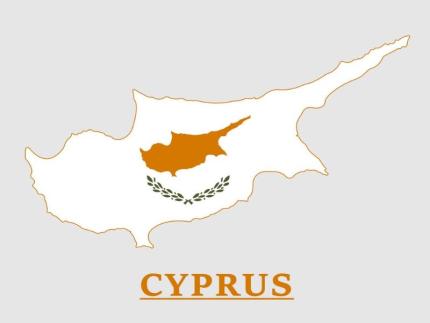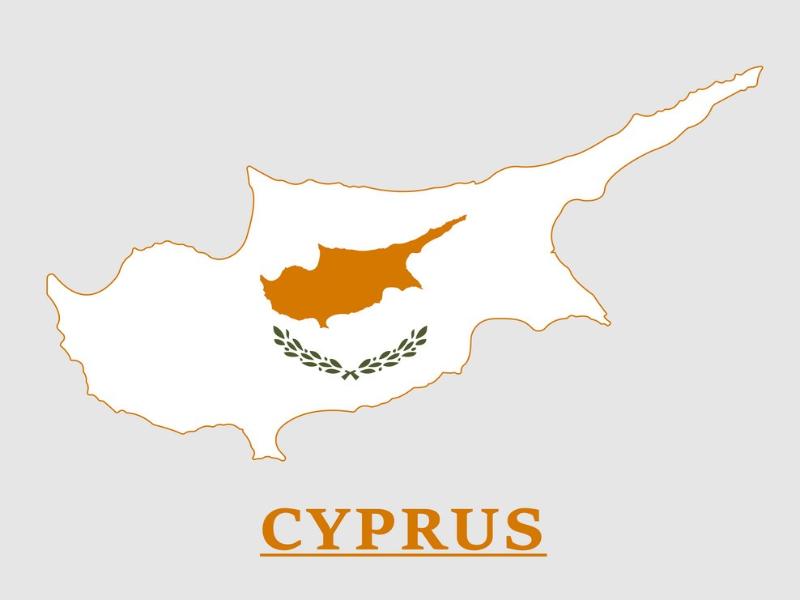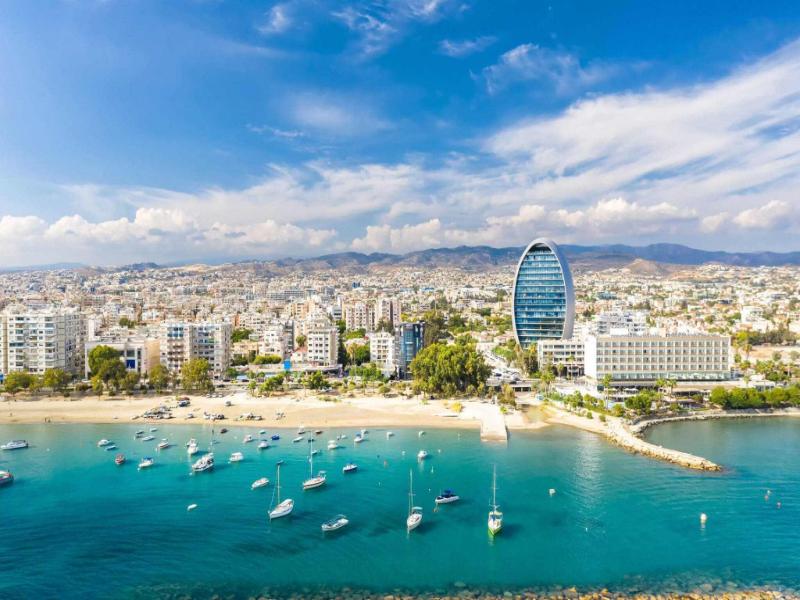Get free consultation
Fill out the form and we will contact you
For a long time, Cyprus has been dubbed the island paradise. It's called this because of the friendly locals and its unique position between forests and the sea, which enhances its beauty. Join us as we explore the outstanding features of Cyprus's geography, climate, culture, and lifestyle in the article below.
For those planning to immigrate or study in this European island nation, they might wonder and want to learn more about where Cyprus is located. The Republic of Cyprus, known in English as Cyprus, is an island country situated in the eastern Mediterranean Sea, south of the Anatolian Peninsula. It is a Western Asian country located on a crucial route leading to the Suez Canal.
Nicosia, the largest city on the island, is also the main seat of the government of the Republic of Cyprus. Positioned at the far eastern end of the Mediterranean, its closest neighbors, Turkey and Syria, facilitate connections between the continents of Europe, Africa, and Asia.
Located at the crossroads of three continents, the island is 75 km south of Turkey, 90 km west of Syria, and 380 km east of the Greek island of Rhodes. With an area of 9,251 square kilometers, it is the third-largest island in the Mediterranean after Sicily and Sardinia, known for its vast grasslands and long, enchanting beaches. Previously, about 36.2% of its area was dominated by Turkish military forces, with 3% under the territory of the British Sovereign Base Areas (BSBA). Its strategic location at the intersection of Europe, the Middle East, and Africa makes travel to these areas quite convenient.
Overview of the Republic of Cyprus and National Symbols
Cyprus boasts a robust economy, with the government-controlled area having a market economy where the service sector accounts for more than 4/5 of the GDP. The most crucial sectors include tourism, finance, shipping, and real estate. Cyprus has been an EU member since May 2004 and adopted the euro in January 2008.
During this period, the GDP per capita reached an average of $2,696 per year. The national economy has prospered and diversified in recent years. According to the latest estimates from the International Monetary Fund (IMF), Cyprus is a base for many foreign businesses due to its highly developed infrastructure. The government's economic policy focuses on meeting the criteria for EU membership.
The banking and financial sectors are thriving, offering numerous opportunities for those seeking a business-friendly jurisdiction with favorable immigration policies. The country operates a free market economy, focusing on the service industries, particularly tourism and hospitality. Previously, agriculture was the key economic sector, attracting one-third of the workforce and accounting for one-third of export value. However, in recent years, the tourism and service sectors have become more significant, contributing up to 78% of GDP and attracting over 70% of the workforce.
Cyprus has witnessed a tourism boom for many years, leading to prosperity. Additionally, the increasing demand from investors and the rising wealth of the population have driven capital growth.
This has led to a large wave of immigrant workers from countries like Thailand, the Philippines, Sri Lanka, along with many residents from Russia, the UK, and other European countries. By the end of 2007, about 124,000 immigrants had settled in Cyprus, with the three largest groups being Greeks (37,000), British (27,000), and Russians (10,000).
Life in Cyprus is characterized by a slow, simple pace, and particularly by the hospitality of the locals. The indigenous people are open, friendly, and sincere, forming one of the most hospitable communities in the world. Additionally, Cyprus is a safe country with a lower crime rate compared to many other Mediterranean countries like Spain, Portugal, Italy, and France.
The main languages on this beautiful island are Greek and Turkish. However, English is the most widely used foreign language, spoken by 80% of the population. English is present everywhere, from shops and signposts to television programs, radio, and some magazines. As of 2020, the estimated population of Cyprus was about 1,204,284 people, with a population density of about 150.4 people per square kilometer.
The people here are diverse and hospitable.
Cyprus stands out with its subtropical climate, making it one of the most ideal destinations for vacations. Due to its geographical location in the southeastern Mediterranean, the island often experiences hot weather, attracting tourists year-round.
Summer is the most popular time to visit Cyprus, with the weather being very hot. Located in the south, summer in Cyprus can be extremely scorching and is not the best time to visit between June and August. Summer temperatures can rise high, peaking at 38°C in the capital, Nicosia, in July and August. In coastal cities like Paphos or Larnaca, temperatures are usually a bit cooler, averaging around 30°C, but humidity is high.
In winter, despite the lower temperatures, Cyprus is much warmer than other parts of Europe, with average temperatures around 16-18°C across the island and plenty of sunshine. This is the ideal time to experience and visit the Republic of Cyprus without enduring the summer heat.
Spring also has pleasant weather, cooler than summer, although it is not the best season for swimming. In March, average temperatures range from 18-21°C on the coast and inland, rising to 24-30°C in May.
Autumn is also a good time to visit Cyprus, with warm weather extending from summer until November, and Mediterranean temperatures remain warmer compared to spring. In Nicosia, average temperatures range from 23-34°C from September to November, and coastal areas range from 23-29°C during the same period.
Summer is the season that attracts many visitors to Cyprus.
This small but wonderful country is considered one of the top study destinations for international students in Europe. With about 7% of GDP spent on education, Cyprus ranks in the top three countries globally for education budget investment, only after Denmark and Sweden. Education is the foundation of the country and the most valuable asset for economic and social development, demonstrated by significant investments in education. Therefore, studying at one of the universities here offers international students incredible opportunities, thanks to highly-rated programs and state-of-the-art facilities.
Additionally, Cyprus is a major hub of business ideas and knowledge, quickly becoming an attractive option due to affordable tuition fees and living costs for international students, numerous job opportunities in the EU and global markets. It is also home to many leading international companies, with a high-quality education system and respected institutions worldwide, elite scholars and professors, multidisciplinary and multilingual degrees, English-taught programs providing excellent research opportunities, along with scholarships and internship opportunities both domestically and across Europe.
Besides factors like language, people, and education, income is another reason why Cyprus is an ideal destination for tourists and residents. Overall, the cost of living in Cyprus is considered low compared to other EU countries, especially compared to large countries globally. For instance, renting a one-bedroom apartment in major cities costs around €700, including basic utilities. A meal at a budget restaurant costs about €10, while a fast-food meal costs around €6.
The island also boasts an excellent road and highway system extending everywhere. If you're visiting for the first time, renting a car isn't too expensive, starting at €12 per day. Public transportation like buses is also popular among locals.
Buses are a popular mode of transportation in Cyprus.
The artistic history of Cyprus can be traced back 10,000 years, following the discovery of numerous Neolithic carvings in the villages of Khoirokoitia and Lempa. Cyprus is also home to many high-quality figurative artworks from the Medieval period.
Traditional Cypriot folk music shares many similarities with Greek folk music, including dances like sousta, syrtos, zeibekikos, tatsia, and kartsilamas. Common folk music instruments include the violin, lute, accordion, and Cypriot flute. A genre of musical poetry known as chattista is played during significant celebrations in Cyprus. Notable composers associated with traditional Cypriot music include Evagoras Karageorgis, Marios Tokas, Solon Michaelides, and Savvas Salides. Cypriot pop music often takes influence from Greek "Laïka" pop music, with famous artists like Anna Vissi and Evridiki. Metal also has a significant following in Cyprus, with bands like Armageddon, Winter’s Verge, RUST, and Blynd Rev.
Walking along the ancient streets of Cyprus, especially in Nicosia, you’ll be captivated by the magnificent Byzantine structures like Hagia Sophia and Buyuk Han. In Limassol, a bustling port city, you'll find impressive medieval castles like Limassol Castle and Kolossi Castle.
Sousta is a dance performed during traditional festivals.
Cypriot cuisine is diverse, with Halloumi or Hellim cheese being the most famous specialties. Halloumi is often prepared and enjoyed as an appetizer, eaten fresh or grilled. Seafood and fish dishes in Cyprus include squid, octopus, red mullet, and sea bass. Cucumbers and tomatoes are commonly used in salads. Popular vegetable dishes include potatoes with olive oil and parsley, pickled cauliflower and beets, asparagus, and kolokassi.
Other specialties of the island include meat marinated in dry coriander, nuts and wine, and various dried and smoked foods like lountza, charcoal-grilled lamb, souvlaki, and sheftalia. Pourgouri (a mix of bulgur and ground wheat) is a traditional carbohydrate dish served with bread.
Fresh vegetables are a common ingredient in Cypriot cuisine. Common vegetables include zucchini, green peppers, okra, green beans, artichokes, carrots, potatoes, cucumbers, lettuce leaves, and grape leaves, along with legumes like peas, black-eyed beans, green beans, and lentils.
If you've been enchanted by the interesting information about Cyprus, yet still have concerns about visa and residency procedures, let us assist you. With our team of experienced professionals, we will support you in visa applications, handling documents, and providing citizenship consultation for Cyprus, offering many favorable opportunities for your European exploration journey. Contact us right away via the website https://quoctichthuhai.com.
Fill out the form and we will contact you





